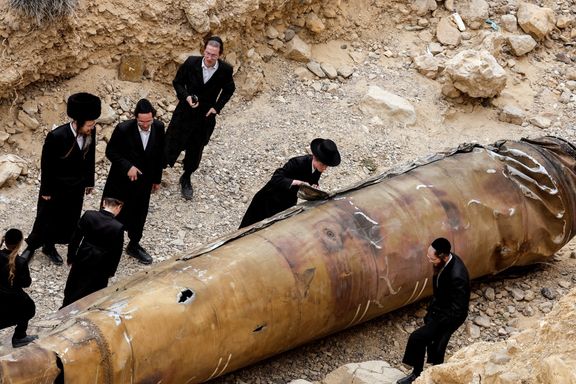Khorasan Daily, a traditionally conservative newspaper distinct from hardliners, argued that while a missile response was appropriate in April when Iran retaliated against Israel’s air strike on its embassy compound in Damascus, the nature of this recent attack is different. The paper suggested that Iran’s proxies should now focus on launching attacks in Tel Aviv to create insecurity, and that the ‘Resistance Front’ should move away from relying solely on missile deterrence.
What's even more intriguing is the newspaper's stance that any response to Israel should not be launched from Iranian territory.
Although few government-controlled media outlets or authorized commentators inside Iran have acknowledged that Tehran’s April attack failed to inflict any damage on Israel, the Iranian public is generally well aware of this fact. Online, jokes frequently mock the IRGC’s missiles and their exaggerated claims. Some have even nicknamed the missiles “flying water heaters,” humorously suggesting they need frequent welding before use.
Arguing that Iran’s missile strategy cannot offer good answers any longer, Khorasan newspaper said, "The region and the Axis of Resistance are now obligated to deliver an appropriate response to the Israeli regime.” The newspaper immediately added that a response at this time must be prioritized, “but with several considerations: first, it should not involve missile or drone operations; second, it should not be carried out from Iranian soil."
It's difficult to determine whether the newspaper was expressing its own opinion or publishing the article under the direction of state authorities or a particular political faction. However, the call for Iran to avoid direct involvement, especially while the top leadership advocates for a response, is noteworthy.
This sentiment is reflected in overall Iranian public opinion, as seen in social media posts: Why should Iran continue to pursue a costly confrontation with Israel and potentially the United States? Many also view a potential war as a threat to the regime's very survival—a possibility that has not gone unnoticed by the Islamic Republic leaders.
Khorasan Daily also argued that Iran’s missile and drone attack in April was successful in demonstrating that Iranian weapons could reach Israel. However, the newspaper suggested that repeating the same operation would not yield additional benefits. Instead, it urged the leaders of Iran’s proxy groups to adopt new tactics and strategies to harm Israel.
The suggestion to make Tel Aviv unsafe without relying on Iranian missiles may hint at terrorist-style operations, similar to those frequently used by Palestinian groups in the past, though with little strategic success. For those in Iran, including regime insiders, who recognize the untenable costs of a serious war, the focus is elsewhere. Many Iranians argue that as long as high tensions with Israel persist, Tehran's hopes of re-starting negotiations with the United States remain dim, forcing the country to continue bearing the heavy burden of sanctions.








